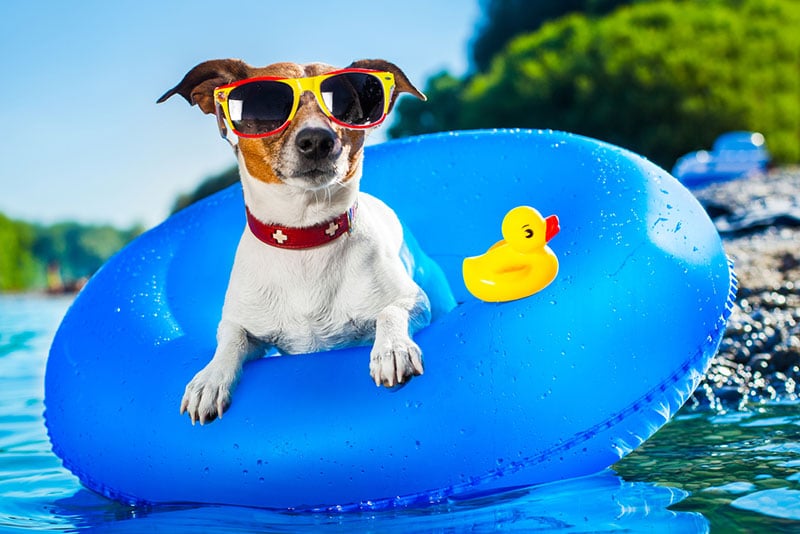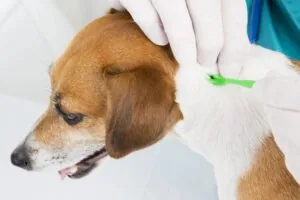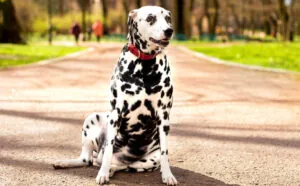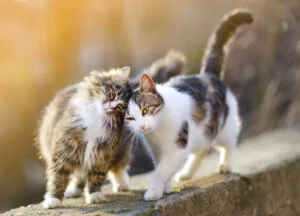How To Avoid Summer Pet Hazards

Summer is almost here and many of us will be spending more time outdoors with our pets. As temperatures rise we might head to the beach or lake to cool off. Many of us will have BBQs and celebrations with fireworks. Of course, this all sounds fun, but we could be putting our pets in harm’s way. The summer months can be dangerous for cats and dogs. Heat and humidity are the obvious dangers, but there are many more. Let’s look at what hazards are most common this time of year.
Heat
Heatstroke
This is probably the most hazardous. Never leave a pet in a vehicle even with the windows cracked! The inside temperature of a vehicle can rise rapidly. For example, if it is 90 degrees outside, the inside of a car can reach 109 degrees in just 10 minutes! As more time passes, the temperatures continue to rise. Your pet could quickly succumb to heatstroke or death.
Dehydration
Another common heat-related danger is dehydration. While not as dangerous as heat stroke, it causes problems for your pet and can escalate into heat exhaustion or heat stroke if not treated. Pets need to drink water frequently when outdoors in the heat. It is a good idea to bring a few extra bottles of water and a dish or collapsible bowl when taking your dog (or cat) on outdoor adventures. On hot days, it is best not to overexert your pet. Drooling, excessive panting, or difficulty breathing means it is time for a break! Find some shade to let you and your pet cool off from time to time.
Burns
We must recognize that our pets are also vulnerable to sunburns. UV rays from the sun is what causes sunburn in people and pets. Too much exposure to UV rays can lead to skin cancer. Dogs or cats with short hair or light colored fur are more susceptible to sunburn. Believe it or not, there are sunscreens made for cats and dogs! Never apply sunscreen made for humans to your pet! Many of the chemicals can be toxic.
Pavement can also cause burns on the paws of dogs and cats. The darker color the pavement, the more heat it will trap. You can avoid these types of burns by walking your pet in the morning or evening hours or by spending short amounts of time on paved surfaces. Grass, sand, and shaded areas are much cooler.
Insects, Spiders, and Snakes
Fleas and Ticks
Almost every pet owner has had to deal with fleas or ticks because they are everywhere. Health officials in North Carolina are expecting the 2017 tick season to be one of the worst due to a mild winter and wet spring. Not only can fleas and ticks can cause discomfort for our pets, they also transmit some serious diseases as well. Diseases such as Lyme, hemobartonella, and ehrlichiosis are just a few that dogs and cats can contract from fleas or ticks. Luckily, there are many options to prevent fleas and ticks from feeding on your pet. Discuss options such as once-a-month flea and tick prevention with your veterinarian.
Mosquitoes
Although insects, spiders, and snakes are common in the south year-round, they become more active in the warmer months. The most troublesome are mosquitoes, which can transmit heartworms to your dog or cat. All that it takes is one infected mosquito to bit your pet once. Heartworms can be deadly if not treated. Treatment is available for dogs, but it is costly and lengthy. There are no current treatments available for cats. Prevention is key, and luckily monthly preventative is available (and often combined with flea/tick preventative) from your veterinarian.
Bees and Wasps
Both cats and dogs love to chase and even eat flying bugs! Bees and wasps, unfortunately, fall into that category. Unless there have been multiple stings, this is generally not an emergency. Sometimes dogs will eat the bee, which can result in a sting inside the mouth. If this happens, the swelling could restrict breathing and a veterinarian would need to be contacted. If the sting occurs elsewhere, ice can be applied to help with the swelling. The stinger can be removed by scraping your fingernail or a credit card over the area that the stinger is lodged. It is not advised to use tweezers as that can cause more venom to be released from the stinger.
Spiders
There are two venomous spiders that pet owners should know about; the brown recluse and the black widow. The venom in widow spiders are a neurotoxin. Once absorbed, your pet may show signs such as cramping, pain, vomiting, and paralysis. A bite from this spider can be deadly, especially to cats, and it is best to contact your veterinarian immediately. On the other hand, the brown recluse bite is rarely fatal. Instead, the venom destroys tissue cells, and can result in a wound that needs veterinary care.
Snakes
Snake bites from poisonous snakes can also be deadly (especially to cats). The copperhead, the cottonmouth (aka the water moccasin), and 3 species of rattlesnakes are of greatest concern. If you saw the snake bite your pet, take your pet immediately to the veterinarian. Do not apply tourniquets, ice, or attempt to remove the venom. It is also not necessary to capture or kill the snake because that could put you at risk for a bite! If you are unsure if you pet has been bitten, but see signs such as vomiting, swelling, or lethargy, it is wise to contact your vet as well.
Lawn and Garden
Part of living in the south is being able to take advantage of the long vegetable growing season. We also like our yards to be beautiful! Fertilizing, getting rid of weeds, and keeping pests under control seem to be a never-ending battle. Some of the products that we use to do this can pose a danger to our pets.
Fertilizer
Because fertilizer contains naturally occurring elements such as nitrogen, phosphorous, and potassium (sometimes iron, zinc, manganese, etc.), it is generally safe to use around pets. Most fertilizer is watered into areas around plants, so there is less concentration on the surface. When exposed to fertilizers, symptoms are usually mild and can cause a dog or cat stomach upset. The real danger is when a pet ingests the product directly from the container (e.g. chewing or eating the bag). This can result in more severe symptoms such as drooling, nausea, vomiting, diarrhea, and difficulty breathing. In this case, contact your veterinarian or the Pet Poison Hotline at 1-855-764-7661.
Pesticides and Herbicides
The category containing pesticides, herbicides, and rodenticides are more dangerous to an animal than fertilizer. While these are much safer than decades ago, they can still be hazardous. By following the instructions exactly as they are listed on the product, you can assume these will pose little danger to your pets. However, if used improperly or if your pet comes into direct contact, these can become dangerous! Most signs will be neurological in nature: tremors, seizures, incoordination. This is an emergency and your pet will need to see your vet immediately.
Tips to prevent these types of poisonings include:
- Store lawn and garden products in a secure area away from pets
- Follow the instructions on the label
- Keep pets away from areas that have recently been treated
Celebrations
The Fourth of July is one of the best celebrations of the year. People are outside with friends and family enjoying a lot of food, drinks, and fireworks. Unfortunately, this can be a scary time for our pets! Our pets are exposed to many hazards on this day.
Large Crowds
Dogs and cats can act differently when they are around groups of unfamiliar people or loud celebrations. This can cause them to be scared and act in ways they normally do not. Often, they will act on instinct. Dog bites are more common around this holiday than others because they may be in unfamiliar environments or frightened by the noises. If you have a young or new dog and are unsure how he or she will react, it might be safer to keep them inside or closely supervised; especially around children.
Fireworks
Not only can these be dangerous to the people setting them off, they can be just as dangerous to our pets. Many dogs and cats are frightened by the noises and flashes of light. Another threat is when dogs chase fireworks, or worse… try to eat them! This can be disastrous and cause burns or severe injury.
Due to all the commotion around this holiday, many pets are lost and hit by vehicles. Keeping pets indoors during these times is the safest bet.
. . .
Summer is a time to have fun with the whole family, pets included! We want everyone to stay healthy and happy; and avoid emergencies (both pet and human)! Just a little planning and prevention can help our four-legged friends enjoy the summer outdoors. Stay safe!
Share This Post
Recent Posts
About Shallowford Animal Hospital
Shallowford Animal Hospital and The Pet Spa at Shallowford are dedicated to the exceptional, compassionate care your pet deserves. Pets hold a very special place in our families, and we treat yours like our own.



